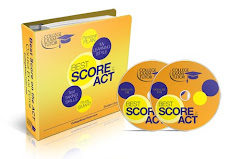Anyone who is at all familiar with the ACT knows how difficult it can be to finish all the questions before the clock runs out. "Time Management" is one of the most discussed aspects of the ACT, but "hurry up and don't waste time" is really insufficient advice. It's not enough to realize that with 60 questions in 60 minutes for the Math test, for instance, that you should spend no more than one minute per question. What students need is a really detailed, practical way of improving their time management skills.
Step 1: Master the Times / Sections
First and foremost, it's important to know the 4 parts of the ACT, number of questions and minutes AND sections, inside out. Students should be able to rattle off by memory that the English test comes first, followed by Math, a short break, and then Reading and Science are last. Parents can help by asking "how many questions are on the Reading test?" (40) and "how many passages does the Reading test have (4).
Step 2: Know Your Times
The English test has 75 questions and is 45 minutes long. While there aren't really 'sections' as such, the two areas tested (the types of questions) are rhetoric and grammar & punctuation. The Math test has 60 questions, is 60 minutes long and has Algebra, Coordinate Geometry and Plane Geometry, and Trigonometry. The Reading test gives you only 35 minutes to read four passages and answer 10 questions on each. The Science test also lasts 35 minutes and has 40 questions, divided among 7 different sections.
Step 3: Know Your Minutes and Benchmarks
Students need to know ahead of time when they will need to be checking the clock for benchmark times to see if they are behind. For instance, about halfway through the time allotted for the English test (22 minutes), you should be at question 38 to ensure that you are on time. You should complete 15 questions every 15 minutes for the Math test, and complete one Reading test passage every 8 minutes. Finally, for the Science test, you should be done with about 20 questions after 17 minutes.
Step 4: Practice the Calculations
It is surprising to see that many students are not proficient at the math skills necessary to manage the clock, so be prepared to practice this critical technique. For instance, if the clock says it is 8:14 and you are starting the English test, what time will you be halfway through? The answer, 8:36, should be written down on the test booklet before going to the first question so you can look at it and the clock periodically. Be able to instantly calculate the benchmark times from any starting time.
Finally, take practice tests to ensure that you are becoming proficient at completing all the questions in the allotted time. Learn how to just guess on questions that you aren't sure on, or that will take too much time to figure out. By watching the clock, comparing the time to your benchmark times, and having the discipline to move on from questions that could get you bogged down, you will master the Time Management aspect of the ACT and get your best score.
Visit http://www.collegeexamtutor.com/ for more information about the ACT and how to prepare, as well as the "7 Keys to College Success" course on making a successful transition to college.

